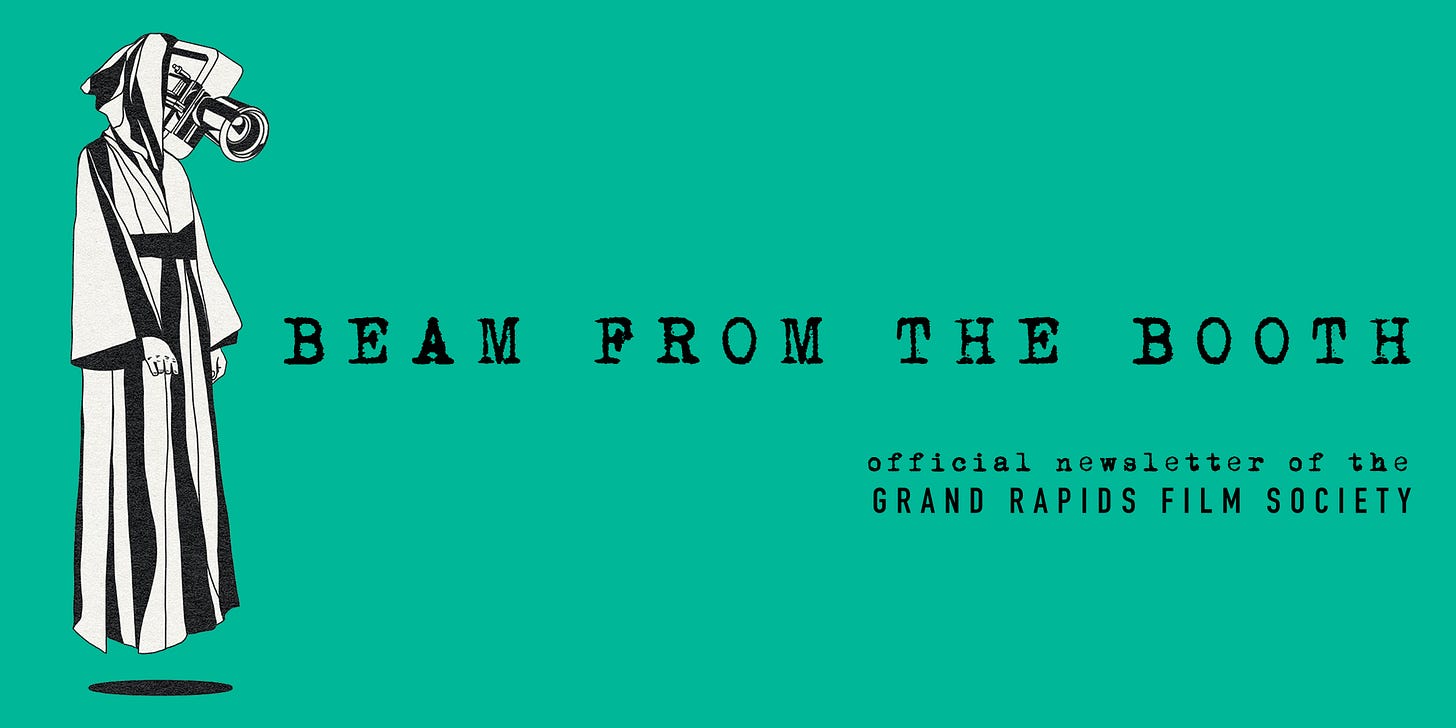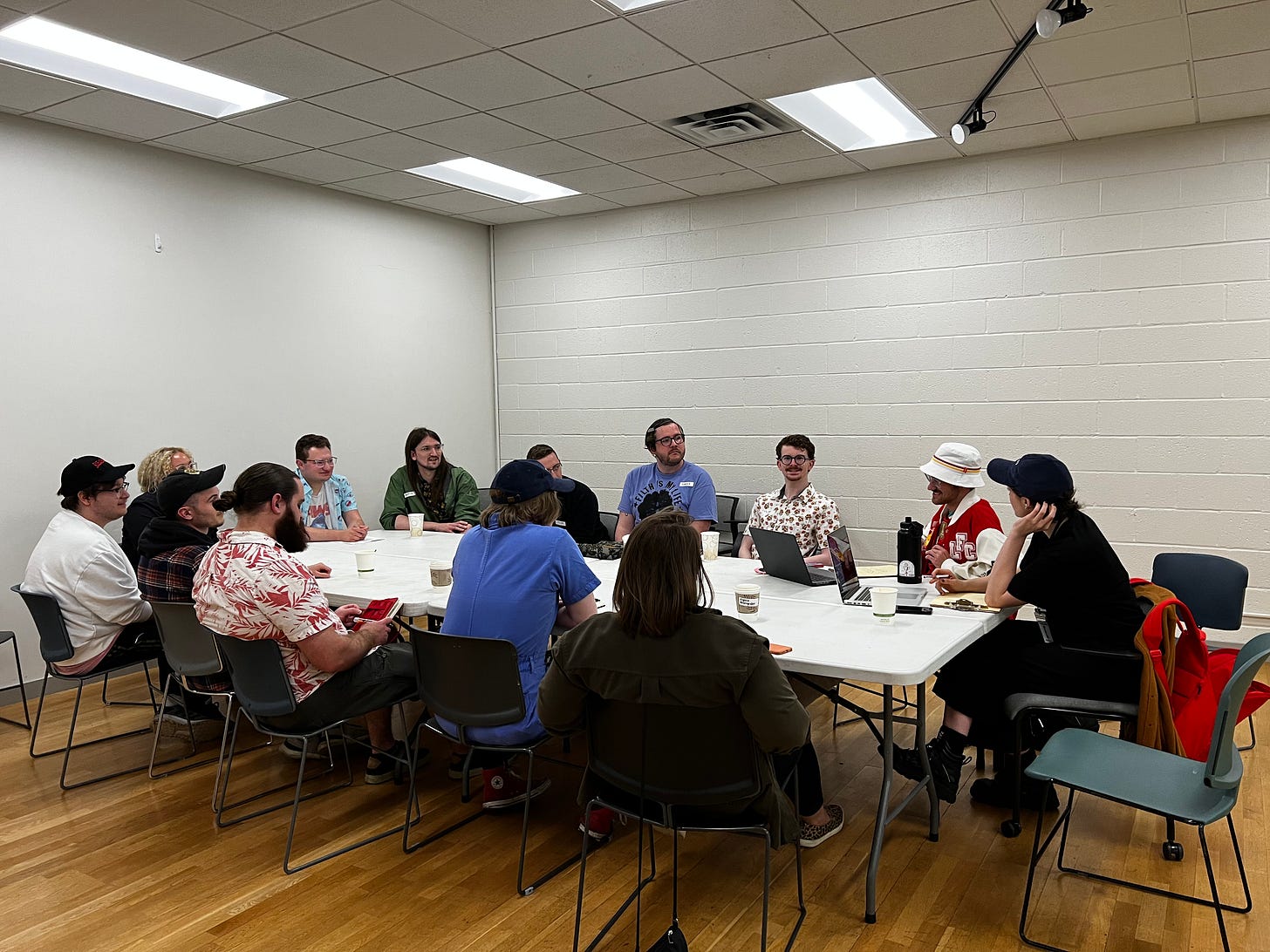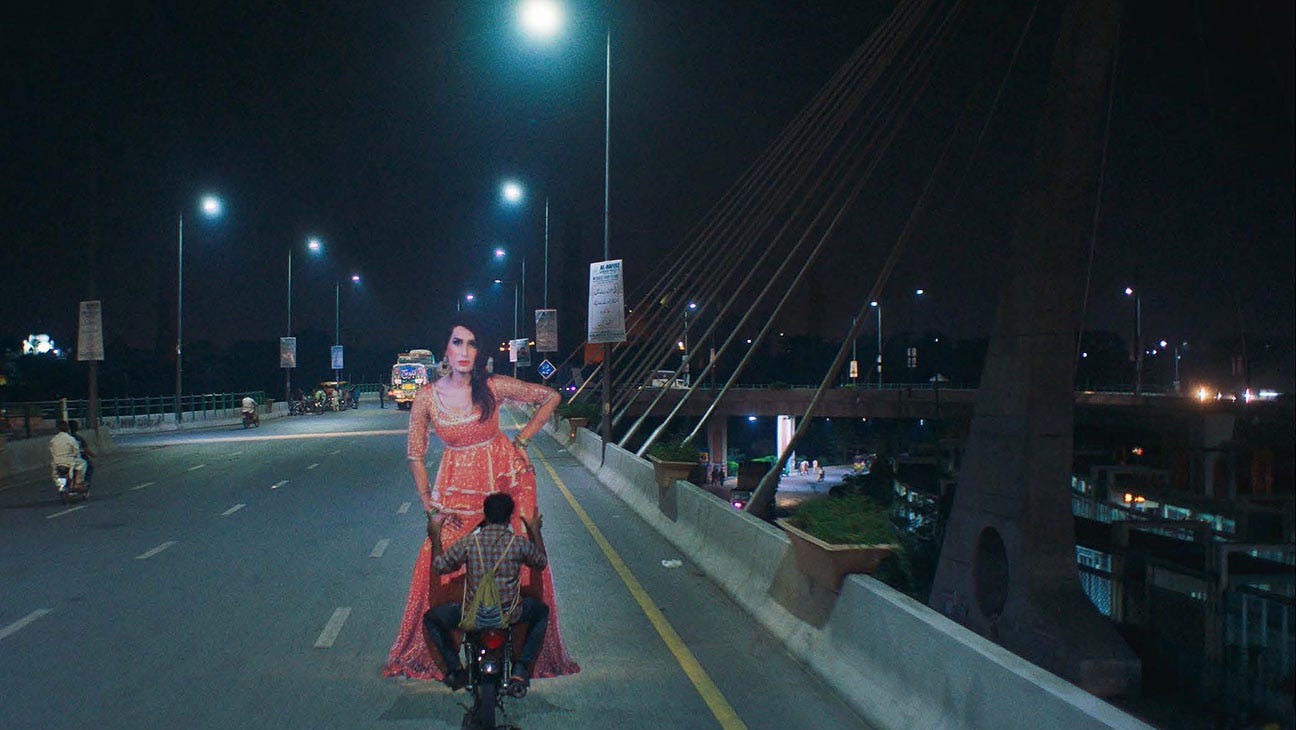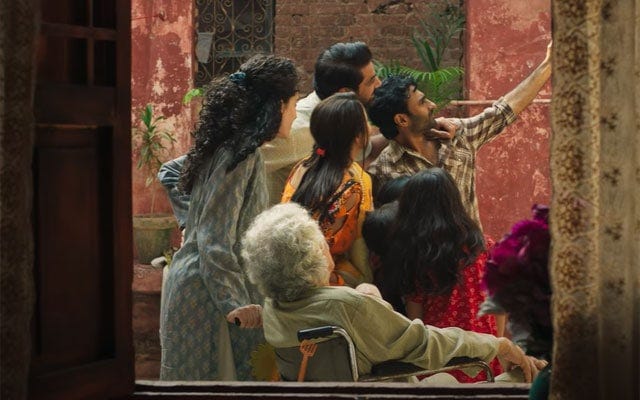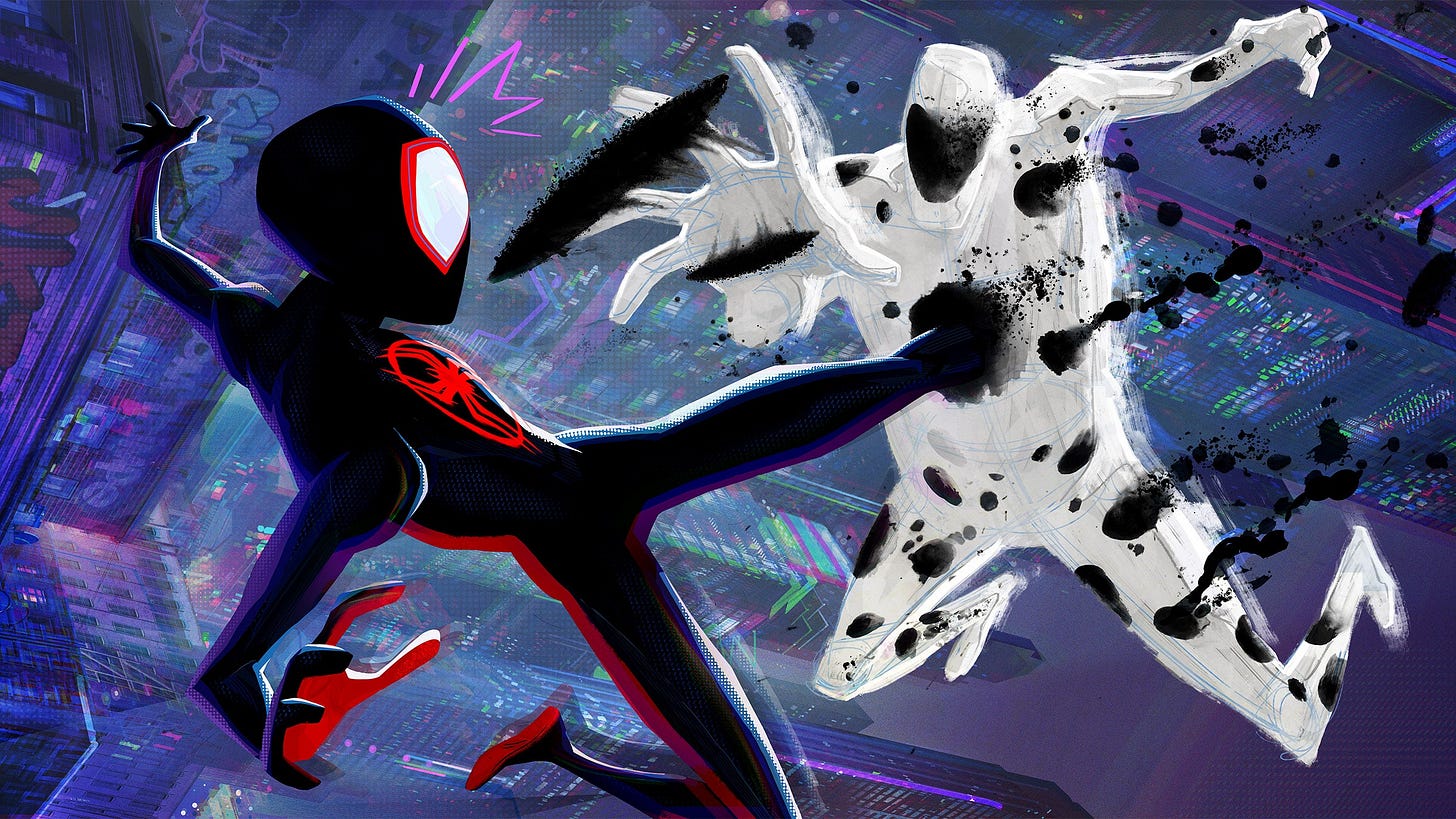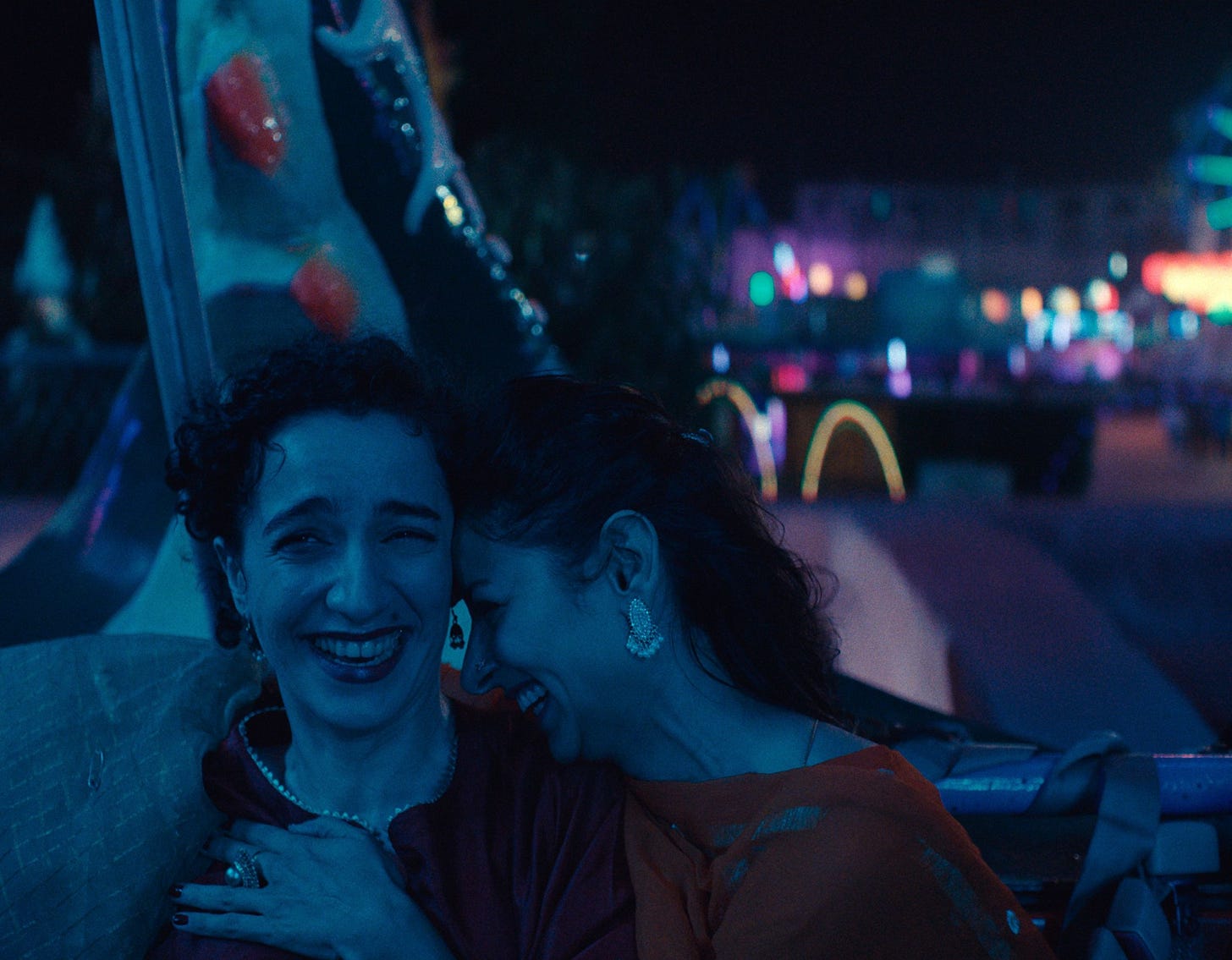[EDITED BY: GRIFFIN SHERIDAN]
Welcome to an all-new installment of BEAM FROM THE BOOTH, brought to you by GRAND RAPIDS FILM SOCIETY!
This past Thursday night, we held our third FILM SOCIETY ROUNDTABLE social event and, once again, it was so great to host all of you who came. Thank you for another evening of enlightening, entertaining, and informative conversations. We can’t wait to do it again on THURSDAY, JULY 13th. Look for an RSVP link soon!
We have a screening next week! Join us in celebrating Pride with a special one-night screening of Saim Sadiq’s JOYLAND this upcoming WEDNESDAY, JUNE 21st.
To kick things off this week is an essay on the film by BFTB’s very first guest writer: Ben Friedman…
GUEST ESSAY:
JOYLAND AND THE PROMISE OF A PAKISTANI NEW WAVE
[BY: BEN FRIEDMAN]
Please allow me to introduce myself. I am a cis-het white dude from Milwaukee who attended GVSU. I’ve only seen one film from Pakistan. In no way am I qualified to write this...but I really wanna hype up Joyland (Saim Sadiq, 2022) for you (and I did a little bit of research). While there aren’t any spoilers in my essay, feel free to skip over the third and fourth paragraphs if you’re trying to go into Wednesday’s screening completely blind.
During the 2022 Cannes Film Festival, I was up to my usual obsessive behavior. I kept tabs open on industry publication websites, refreshing those pages constantly to read every review possible. One film that I came across, Joyland, was the first Pakistani feature to premiere in the Croisette’s Official Selection. It was a major success in the Un Certain Regard section, winning the Jury Prize and also grabbing the Queer Palme. Let’s back up a second. The Queer Palme, an award that highlights LGBTQ representation at Cannes, went to a film from a religious republic whose government “criminalizes same-sex sexual conduct, placing men who have sex with men and transgender people at risk of police abuse and other violence and discrimination.”
Six days before it was set to play in theaters nationwide, the Pakistani government banned Joyland. I desperately wanted to watch the movie. It played at the Milwaukee Film Festival twice, but I had to miss it both times due to scheduling reasons. Luckily, it was brought back a couple weeks later, and I pounced on the opportunity to see it. The movie stunned me. When Joyland ended, my body guided me out of the theater. I felt the sudden urge to walk to the nearest body of water. Luckily, Lake Michigan was only a handful of blocks away. For about 20 minutes, I stared into nothing but the abyss of the sea. Even if it rained, even if it snowed, even if a seagull pooped on my head, I would have still stood there wanting to capture the beauty of the moment. Why did this film affect me so much?
The power of Joyland can be found in its ensemble of deeply layered, imperfect characters. In one of the best Letterboxd reviews I have ever read, Nabil Hussam identifies the film as “a devastating tale where almost everyone is guilty, but no one, in particular, is to blame.” At the center of the narrative is Haider, an unemployed man living in a conservative Punjabi household. He is directionless, like a college senior who wanted to study sculpting but was pressured by his parents to major in business. His wife, Mumtaz, is the one who works to bring home the biryani. The couple does not have any children. Haider’s father, Amanullah, openly favors his brother, Saleem, a working husband with a devoted homemaker for a wife as well as two children. However, everything changes when Haider secures a position at a mujra (comparable to burlesque). The most liberated character is Haider’s new boss, Biba, the heart and soul of Joyland. She is a trans woman with a sense of agency and drive. Haider cannot help but be enamored with her charismatic presence — and neither can we.
These richly written characters are utensils with which Sadiq weaves complex themes. Joyland is about personal discovery and finding yourself, something we can all relate to. It is about desire but also portrays how a patriarchal institution built on oppression can weaponize the repression of temptation. Characters might make selfish and/or destructive decisions; they may harm one another; but this is a humanist drama that shows every side of the story, no matter how you personally feel toward what you see on screen. Joyland brings Pakistani society to the viewer, warts and all.
The ethnically-diverse Pakistan, located in South Asia, is surrounded by countries that are frequently covered in the American news media. China is to the northeast. Afghanistan is to the northwest. Iran is to the southwest. And, finally, India is on the other side of the southeast border, sharing a historically hostile relationship amplified by geopolitical disputes which go all the way back to the days of British colonialism. Though not entirely secular nor entirely fundamentalist, Pakistan’s status as an Islamic republic means that religion impacts just about everyone.
Popular cinema, once known as Lollywood, dominates the Pakistani film industry with movies that imitate Bollywood style. But the greatest looming force over filmmakers is the Central Board of Film Censors (CBFC), keeping a tight handle on what citizens can watch. Thus, art cinema can be difficult to find let alone produce. Khoosat Films has fought to put creators first, even if it places the production company in danger of governmental (and possibly militant) retaliation. Their latest release, Joyland, brought international attention to the company. The CBFC eventually gave in to the global backlash toward its nationwide ban of the film, resulting in a censored version with domestic distribution. While the battle may appear to have been won, the war is far from over. The film is still prohibited from being shown in the Punjab province, the most populous territory of the country and where the story takes place. Protests related to former prime minister Imran Khan’s political movement, Jail Bharo Tehreek, have been met by a crackdown on all forms of media. This makes matters worse for people like Saim Sadiq. With something as monumental as Joyland fresh in everyone’s mind, it is immensely saddening to think that a potential ‘Pakistani New Wave’ could be blockaded by bureaucratic walls.
But where can the filmmakers of Pakistan look for inspiration? Another nation has had tense border relations with a neighbor ever since one of them achieved independence from Britain in the late 1940s: that country is Palestine. Elia Suleiman’s Chronicle of a Disappearance shook up the 1996 Venice Film Festival in a way similar to Joyland at Cannes. They both took home awards. Reactions were about the same: hold up, THAT film came from THERE? But making a movie in between the First and Second Intifada was tough. Suleiman wouldn’t come back until he dropped Divine Intervention on Cannes in 2002, winning the Jury Prize. With its absurdly comedic, Jacques Tati-esque representation of a bloody conflict, his sophomore feature was a game changer. It lit a fire under Palestinian cinema and was followed by a surge of filmmakers from Hany Abu-Assad to Annemarie Jacir. Projects tended to be international co-productions. In fact, Salt of this Sea (Jacir, 2008) had as many as eight countries attached to it. Diplomacy is key to the promise of a Pakistani New Wave.
Those living in the diaspora, ‘Overseas Pakistanis,’ can be found around the world. Romania, Malaysia, the UK, and Saudi Arabia are just some of the growing number of countries that people of Pakistani descent call home. The rise of films made by Overseas Pakistanis has followed suit, to mixed results. Sundance darling Polite Society (Nida Manzoor, 2023), from the UK, has put up somewhat disappointing numbers for an action movie in its domestic market. Pakistan did return to Cannes this year with In Flames (Zarrar Kahn, 2023), a co-production with Canada that played in Directors’ Fortnight. But so far that one only has distribution in France. Suffice it to say, a film like Joyland needs your support. By watching it at the Wealthy Theatre on Wednesday the 21st, you join the fight for artistic freedom. But it gets better than that: if Pakistan does become less restrictive and turns out to have the next big cinematic movement, don’t you want to be able to say you saw the Grand Rapids premiere of Joyland before it all took off?
FILMMAKER SPOTLIGHT:
NOAH BASHORE
[BY: NICHOLAS HARTMAN]
We have to start with the basic questions first before we can really dive in. Let’s begin, shall we? Who is Noah B? Tell us about yourself.
NOAH BASHORE: Oofa doofa. Who am I??
Well, I grew up in the village of Sand Lake, MI, and come from a family of 6 kids (I am number 4). I was a Marching Band kid, Dungeons & Dragons kid, Theater kid, and would secretly make little YouTube videos about Spider-Man on my iPod/iPhone for fun.
Later, I attended Central Michigan University for a year and Kendall College of Art & Design for 3 semesters but dropped out of both because they were just really expensive, and I wasn’t particularly motivated enough to stay. YouTube and podcasts were my film education, and I felt like I was learning more outside of class than in.
I’m obsessed with romantic comedies/dramas, coming-of-age stories, sci-fi, and horror. Mike Mills is probably my favorite director right now, and I could talk about C’mon C’mon till the cows come home, but I’m also a pretty nerdy/neurodivergent person too, so I could equally ramble on about my love for Dimension 20, superheroes, aliens, and stuff like that.
What gets you out of bed in the morning, Noah? What excites you about this strange thing called “life”?
NB: What gets me out of bed?
Spite!
Half kidding.
Over the past few years, I’ve just had this intense drive to make the things that I want to make, connect with people, grow, and build a better life for myself in the long term. The spite isn’t really directed at anyone or anything in particular but more so at the little voice in your head that hollers “You can’t do it!”
I’m trying to feed a different voice that says “fuck you, watch me!”
It’s not a unique thought, and not to be a downer, but it can be hard to get excited about Life with a capital “L” because of how batshit crazy the country is and the unknowns of it all. The internet scares the shit out of me, and we’re exposed to all of this stuff every waking moment, but it equally gives me excitement and hope because of seeing all the amazing art that people are creating all the time and the movements and ideas that are being spread — both locally and nationally.
I think our capacity to create, fail, learn, grow, come together, and be better is what excites me.
Tell our readers about your journey into the world of filmmaking and how and why you got into it.
NB: Basically, what really kicked off my curiosity about filmmaking, in the sense of This-Is-A-Thing-That-Actual-People-Can-Do, was my older sister showing me 500 Days of Summer when I was 12 years old. I became obsessed with it and vividly remember watching all of the BTS docs on the DVD about the director Marc Webb, the production design, and where they premiered the movie at Sundance.
When Marc Webb went on to direct The Amazing Spider-Man, I was glued to the internet and kept up with all of the latest set photos, and would make these really bad YouTube videos where I talked about the production and theories about the film’s plot. I basically taught myself how to edit on my iPod using iMovie to make those YouTube videos and just kept going from there.
My actual first short was a bad spoof of Skyrim and Lord of The Rings that I did in high school with some friends. We were supposed to make a poster that explained the photosynthesis process for a biology class, but we made an 18-minute fantasy film called “Photosynthe-Quest” instead.
In college, I wrote and directed a handful of awful shorts, but none of them were anywhere near the scale of Walter, Grace & The Submarine. They were all still very much in the YouTuber headspace where I was wearing most of the hats.
Simple question but who/what inspires you to create?
NB: A lot of things inspire me! It really depends on the idea or project, but I am really influenced by the music I listen to, podcasts, life experiences, online creators, politics, photography, and the movies I watch and love.
In terms of specific directors, I really love Mike Mills, Noah Baumbach, Greta Gerwig, Taika Waititi, Richard Linklater, the Duplass Brothers, Cooper Raiff, Jim Cummings, Sam Esmail, Alfonso Cuaron, Steven Spielberg, and The Daniels.
Let’s begin to dive into your film Walter, Grace, & The Submarine. Give us a little breakdown of what your film is about.
NB: Walter, Grace & The Submarine is essentially about two young artists who hang out for a weekend, bond over parental/religious trauma, and get caught up in a right-person-wrong-time situation. Walter just moved to Grand Rapids and Grace is in the process of moving to Portland, Oregon. The entire film revolves around Walter and Grace having various conversations and joking around until they separate.
It’s a very, very small movie that wears its heart on its sleeve, and you kind of have to meet it where it’s at.
To my knowledge Walter, Grace is your first feature film, correct? Why did you want to tell this specific story as your first feature?
NB: It is my first feature!
This story was the one I wanted to tell for a couple of different reasons.
In an artistic/personal sense, it was a story I wanted to get out of my system in order to process some things in a therapeutic way. It’s not an autobiographical piece; the events of this movie didn’t actually happen, and the characters aren’t truly similar to any actual people, but the emotions behind the story do rhyme with real life. ‘Indie RomComs’ are one of my favorite genres and tend to be the kinds of movies I seek to watch in general, so I feel like there’s a core audience out there that will really enjoy what we’ve made.
In a filmmaking/career sense, I knew that a two-person, dialogue-driven, romantic comedy in the vein of Before Sunrise or Shithouse was a very actionable concept for a first feature that I knew I could feasibly pull off with the help of friends and the folks in my network. I don’t have a body of work to really enter the film industry and make a living, so I figured a project like this could help jumpstart something for myself.
Let’s talk about casting. Finding actors that are believable and work well together on screen can be quite difficult. Tell us how you found Walter and Grace.
NB: Basically, I made a bunch of casting call posts to various Chicago/Michigan filmmaking/acting Facebook groups detailing what the movie was about and what I was looking for in the two leads.
In retrospect, I should’ve reached out to some Chicago talent agencies or peeped Backstage, but It wound up working out very well in the end.
Kyle Patrick, who plays Walter, DM’d me, asked to read the script, and immediately was hooked on it and asked if he could share it with his buddy Jessie Carl, who plays Grace. A fair amount of people sent in self-tapes, but Jessie and Kyle were the obvious choices. It was clear that they were not only genuinely talented but also really connected with the script and understood what I was going for. I’m really thankful for both of them.
Walter, Grace is very dialogue-driven and, as a filmmaker myself, I can say writing conversations that feel real/genuine is very difficult. Talk about your approach to writing dialogue.
NB: It is really hard!
First of all, being the writer/director/editor on this project was a very educational experience.
What seems good on the page may not translate well to being spoken aloud and shot on camera; what seems good in person and on camera might not play out well in the edit; and, in the edit, you really have to decide what’s absolutely essential for the overall film. The process has informed how I’ll write future stories, and it’s been really interesting.
In terms of my approach, I really just tried to write these two characters, tone-wise, in the vein of myself, my friends, and young people in general with the ways that we talk about sad stuff, joke around, and the conversations in-between. It was my goal to strike a tonal balance between sadness and humor, and it was really intentional throughout the entire thing.
Having a solid outline always helps me have a goalpost for any given scene. I’ll have ideas for lines or conversations, and I’ll write them in my Notes app and it helps take that outline and color it in. The inspiration can come from real conversations, movies, tweets, Reddit threads, or podcasts. Once I have a solid idea of who the characters are, their opinions on certain topics, senses of humor, and cadences just kind of appear on the page. Getting into a flow can be really fun especially when it’s just banter, but it’s challenging when you’re not sure what’s really working.
The self-doubt/criticism always creeps in, and I honestly wasn’t sure how much of the script was actually working until Jessie and Kyle submitted their tapes and started rehearsing with me. Writing dialogue is really hard, but it helps to have good actors take what you’ve created, understand what you’re doing, elevate it, and make it their own.
Let’s talk about your process from idea to picture lock. Where do you begin and where does it end?
NB: Idea and writing-wise, I have a bunch of Notes app notes of ideas for scripts. I’ll take an idea I’m most excited about, make a Spotify playlist of songs that I think would fit a hypothetical soundtrack for a final movie, and just have that on repeat until I have an outline. Next, I’ll take that outline, make sticky notes representing scenes within the three acts, and slap them up on my wall so I can rearrange them if need be or add scenes if something comes to mind. Then I’ll just write a bunch, get notes from the people I trust, and just get it to a point where I know it’s functional. In general, I like to write things I know I could make, so with Submarine, basically, all of the locations were written with places I knew I could have access to in mind. I also decided to incorporate needle-drop moments throughout the script by an indie artist named Ings and asked early on if she wanted to be involved with the project. So way before I locked down talent, there was already a soundtrack/composer on board.
The production process was just bringing on board a group of people who are more talented than me in every way. This movie literally wouldn’t exist without my producer and partner in crime, Gillian Noonan, and our talented cinematographer, Rich Tran. Essentially all of our money was raised using the crowdfunding platform Seed & Spark, and with the help of Jessie, Kyle, and our talented crew, we were able to shoot the movie in 14 days in Grand Rapids. It was really hard and I learned a lot, but I’m very thankful for everyone.
Post production has been a big ordeal and is still ongoing, but we’re reaching picture lock in the coming days, and it’s very exciting. I work as a prep cook at Stella’s Lounge so it’s been a strenuous process trying to balance food service work and making a feature film. I’ve also never edited a project this long before, so all-in-all it’s been a trial-by-fire kind of situation, although very fun.
I really enjoyed how you played around with gender stereotypes in this film. In most romance films we tend to see the woman cry, eat ice cream, etc. However, the roles are reversed with Walter and Grace. Tell us about this decision.
NB: When it comes to movies of all genres, I think it’s really important to feature men being emotional and vulnerable and not have it be the butt of a joke or viewed as a kind of weakness. I think masculinity, both positive and toxic, is a multifaceted thing and it’s something I want to continue to explore in the stories I tell in the future. I’m also just an emotional guy who likes ice cream and romcoms, so I thought that trope reversal could be fun and ring true.
One of my favorite things about this film is the innocence it captures. A lot of modern film/television is quite over-sexualized and sometimes if feels like relationships aren’t built on screen anymore. There’s a specific scene where Walter and Grace decide not to sleep together and, from there, you see them build their relationship. In one scene, Walter and Grace share their art with each other. To me, that can be just as vulnerable as having sex because you’re sharing yourself with someone. This act of sharing art was far more intimate than a sex scene.
Can you talk about this and why you chose to take this path?
The decision behind not incorporating a sex scene was both an artistic choice and a logistical one.
The film is partially about religious trauma and the ways that manifests in relationships, so to me having that boundary be expressed and acknowledged given their situation, and then with further context provided, was important for the character's depth and development, but also to create a feeling of safety/trust for Walter and Grace. As you mentioned, these two characters don’t have sex, but they hold each other, talk about their art, and feel seen by one another. It’s a different kind of intimacy that still leads to an eventual heartbreak.
As for the logistical side, when I was writing I wasn’t sure what kind of resources we would have for the film or what the crew make up would hypothetically look like in terms of gender. It was important for me that the actors felt protected and in control, especially on this scrappy indie level, so I didn’t want to incorporate a sex scene unless I felt it was necessary or I was sure we’d have access to an intimacy coordinator.
I get the feeling that Walter is somewhat of a hopeless romantic. A guy who just wants a real connection. Be real with me, Noah: are you writing from personal experience? Are you a hopeless romantic?
NB: There are chunks of me in both Walter and Grace, although I’m different from both of them in a lot of ways. I think Walter yearns and goes after romance in an unhealthy sense, to fill a void, but is still young and growing, so I feel for him. This is not an autobiographical piece, but I’d say I’m pulling from personal experience in the sense that I know what it’s like to be in their kind of situation.
I do know what it’s like to meet someone at entirely the wrong time. It’s like you both speak the same language, are from the same planet, and everything feels easy. But then you’re left with the frustrated, hit-by-a-truck feelings of “Holy shit! Where did you come from?! Why didn’t we meet sooner!? Fuck!!” The gears aren’t aligned, and it just isn’t meant to be.
To answer that question: yeah, I am a hopeless romantic.
The whole film was shot here in Grand Rapids, MI. So many filmmakers want to leave Michigan and shoot in bigger cities. Can you talk about the advantages of staying in Michigan to shoot your film?
NB: Home-field advantage! Although it might be scrappy, I think staying and telling your story in Michigan gives you the opportunity to not only be more introspective and personal but to work within a far cheaper environment to live in, a wide variety of locations, and fewer hurdles to clear.
I understand the appeal of wanting to move to places like NYC or LA, I really do, but if you’re a lower middle-class person with barely any connections trying to make art, like me, the notion of busting your ass to barely stay afloat in those towns kind of sounds like an actual nightmare.
To me trying to claw my way up in a coastal city in our current political/socio-economic landscape sounds like trying to start from the bottom at McDonald's and work my way up to be CEO or something. In my view, metaphorically speaking, the path forward is to build our own restaurant.
What’s your next step with Walter, Grace? Are you looking to submit to festivals and if so, do you have an eye on any?
NB: My editing is finished and we’re moving into sound/color/music!
The big dream for me is getting into a festival like SXSW, but from what I understand, festivals like those are kind of the ‘cool kids club’ so we’ll wait and see. Fingers crossed. Really, I’m just excited for the opportunity to get into any festival and be able to watch our movie with an audience.
There’s so much that can happen on set whether it’s good or bad. Tell us a fond memory you have and a hurdle you faced on set.
NB: There are a lot of fond memories from being on set, but one that comes to mind happened off-set at the AirBnB we rented out for the cast and crew. I was walking upstairs into the living room one night where Jessie and Kyle were running lines for a specific scene. They had sticky notes on their foreheads and were whispering, laying down on the ground, and laughing together. Getting to work with them was really cool, and it was great to see them have fun during moments like that.
In terms of hurdles, I’m a neurodivergent person and communication is a struggle in general. When it comes to directing, that’s basically 90% of the job. This project was a huge learning experience for me, and although I struggled, I feel like I’ve grown a lot and feel more confident in tackling another big project again.
As an artist/filmmaker myself, I know that ideas are always blossoming and I identify with the continuous need to create. What’s next for Noah? What story do you want to tell next?
NB: I’m working on a story about a cryptid-loving brother and sister duo who decide to go on a road trip to the Upper Peninsula to find their estranged older brother and punch him in the nose in order to get revenge for him being their childhood bully. It’s called “DogMan.”
To all the filmmakers out there that are reading this interview — what advice would you give?
NB: Go read the book Like Brothers by Jay and Mark Duplass.
Go watch Shithouse by Cooper Raiff and Krisha by Trey Edward Shults
Write what you know. I know everyone says that, but it’s just really true. Any story that doesn’t come from a personal place, at least a little bit, isn’t really worth telling. Sit down with a pen and notebook, put in the time, and do some journaling and self-reflection. Who are you? What do you believe in? What scares you? What kinds of small-scale movies impact you the most? What’s a story that wouldn’t exist if you weren’t the one creating it? Write the smallest possible story you can, one that you know you can pull off. It should have very minimal locations/characters but also have enough foundation to focus on good performances, good sound, and good production design. Make it funny and sad.
You’re in your final moments of life and you get to watch whatever film you want — what film and why?
NB: Lilo & Stitch. Although I don’t remember the experience, it was the first movie I saw in a theater.
My earliest memory of any movie is watching Lilo & Stitch in my parent's old big van that had a VCR inside of it and making them blast the speakers because it was so immersive and cool.
The movie just means a lot to me, and I think it’s perfect.
Marty McFly and Doc Brown show up at your doorstep and tell you that you can go anywhere in time. Where are you going and why?
NB: Roswell, New Mexico, 1947. Wanna see what went down.
Any last thoughts you want to leave us with?
NB: Maybe I’m just inexperienced, but I don’t think anyone is truly ‘ready’ to make their first feature. You can make as many short films, ads, Youtube videos, or corporate projects as you want; making a 90-minute-long movie from scratch is a fundamentally different, challenging, and far more vulnerable thing to do. I’m the editor for an indie filmmaker podcast called “Just Shoot It,” and I can’t emphasize enough how I’ve listened to numerous filmmakers who’ve appeared on the show talk about imposter syndrome or feeling a level of inadequacy despite having pretty successful careers in the industry and making really cool pieces of art. At the end of the day, those feelings never really go away, but we have to start somewhere and give ourselves permission to hypothetically fail in order to learn and grow.
We’re constantly bombarded with gargantuan movies whose sole purpose is to function as profit machines for the rich people that own them but, as a result, look like hot garbage and lack emotionally compelling characters. Everyday moviegoers take notice and it’s part of why people don’t go out to theaters. As a community, we should Zig where they Zag and not look to Hollywood as an example of the kinds of movies people think are actually important. We should be emulating what Richard Linklater and the Austin Film Society accomplished and build out the foundations of a film scene of our own here in Grand Rapids. If we’re self-generating, boost each other up, and offer unique and diverse perspectives with what we create, we’ll stand out and people will begin to take notice.
ON CREATION, COLLABORATION, AND ACROSS THE SPIDER-VERSE WITH BRIAN MICHAEL BENDIS (GRFS EXCLUSIVE)
[BY: GRIFFIN SHERIDAN]
I had the distinct pleasure of speaking with BRIAN MICHAEL BENDIS earlier this week.
He is a living legend of the comic book industry, the co-creator of numerous characters that are now household names, and, most recently, an Executive Producer on Spider-Man: Across the Spider-Verse — the long-awaited sequel to the Academy Award winning Spider-Man: Into the Spider-Verse that is currently melting minds in multiplexes all over the world.
Check out a video of the GRAND RAPIDS FILM SOCIETY EXCLUSIVE INTERVIEW below!
UPCOMING EVENTS
JOYLAND (Sadiq, 2023)
WHAT: Haider lands a job at a Bollywood-style burlesque, where he is a backup dancer and becomes infatuated with a strong-willed trans woman.
WHEN: Wednesday, June 21st, 8:00pm.
WHERE: The Wealthy Theatre
And so we’ve arrived at the end of another BEAM FROM THE BOOTH! We appreciate you taking the time to read it and truly hope you’ll continue to do so. Be sure to SUBSCRIBE to get each issue in your inbox every FRIDAY and stay up-to-date on all things GRFS!
Plus, join us on social media! We’d love to chat with everyone and hear YOUR OWN thoughts on everything above (you can also hop in the comments section below).
Know someone you think will dig BEAM FROM THE BOOTH? Send them our way!
Look for ISSUE #20 in your inbox FRIDAY, 6/23!
Until then, friends...



